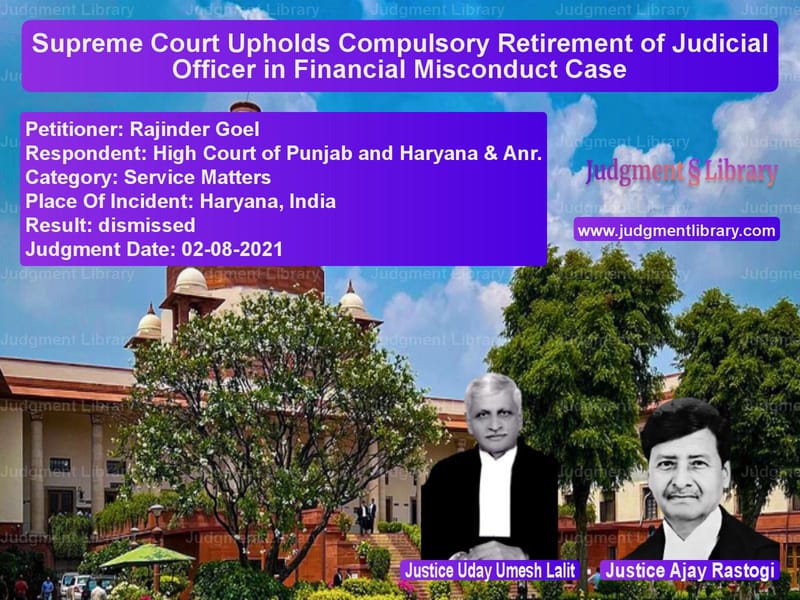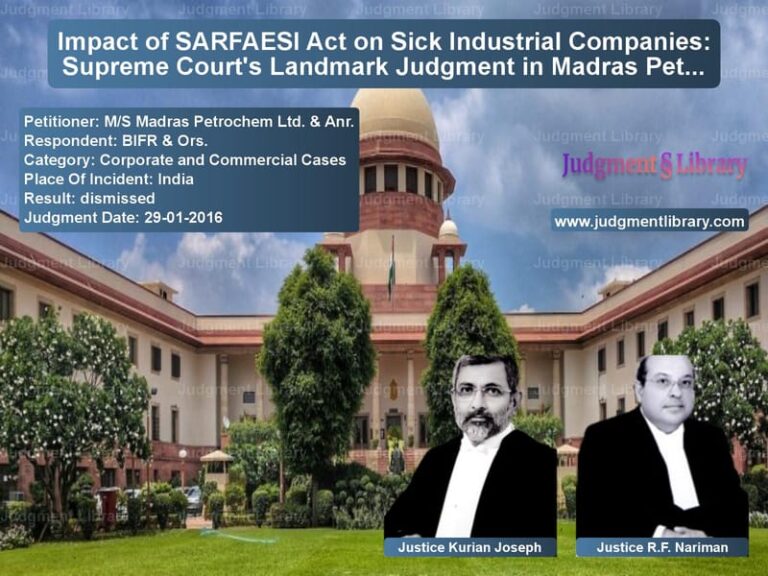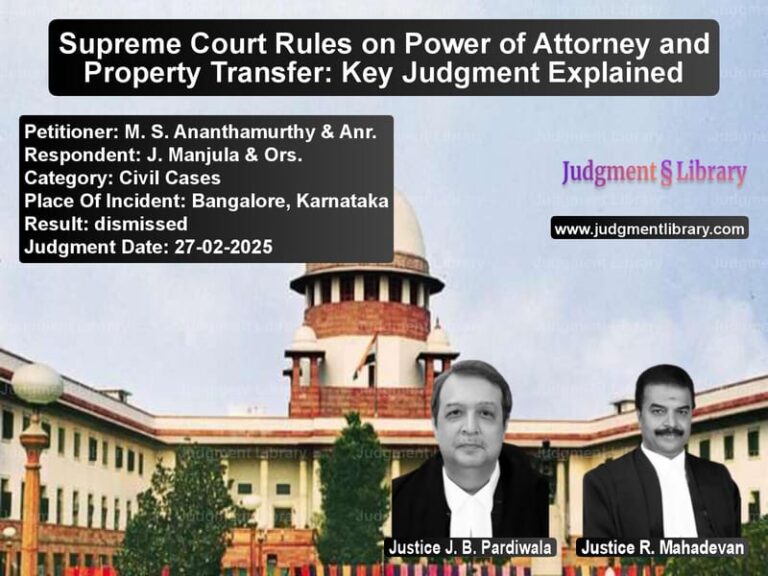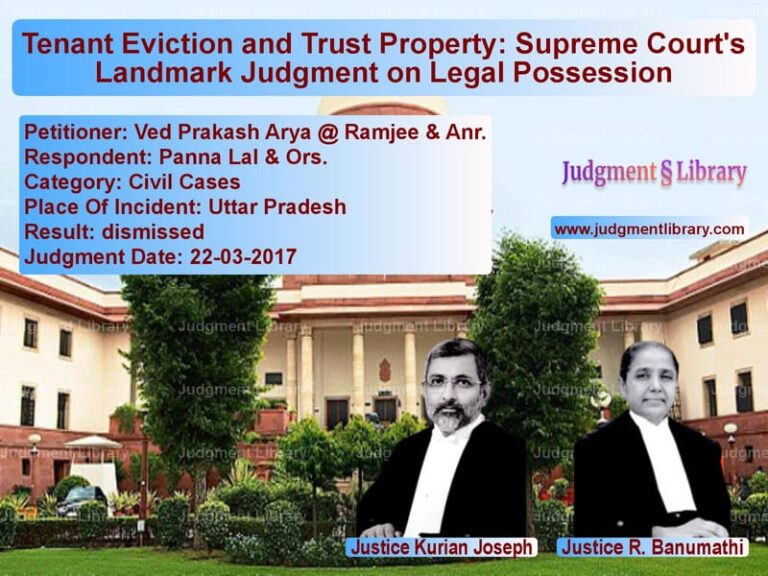Supreme Court Upholds Compulsory Retirement of Judicial Officer in Financial Misconduct Case
The case of Rajinder Goel vs. High Court of Punjab and Haryana & Anr. revolves around the compulsory retirement of a judicial officer from the Haryana Superior Judicial Service due to financial misconduct. The Supreme Court was tasked with determining whether the Full Court of the Punjab and Haryana High Court was justified in rejecting the findings of its Vigilance/Disciplinary Committee and recommending the officer’s compulsory retirement.
The petitioner, Rajinder Goel, challenged the recommendation of the Full Court and the subsequent order issued by the Governor of Haryana, which resulted in his compulsory retirement. The Supreme Court ultimately dismissed his petition, affirming the High Court’s decision.
Background of the Case
The dispute arose when complaints were made against the petitioner, leading to an inquiry into his financial transactions. Key facts of the case include:
- The petitioner joined the Haryana Judicial Services on February 16, 1996, and was promoted to the Haryana Superior Judicial Services in 2008.
- Following complaints against him, an inquiry was initiated regarding his financial transactions and assets.
- The Vigilance/Disciplinary Committee initially found no major evidence against him and recommended clearing him of charges.
- However, the Full Court of the Punjab and Haryana High Court rejected the Committee’s findings and decided to impose compulsory retirement as a penalty.
- The Governor of Haryana accepted the recommendation, issuing an order for his immediate retirement on January 5, 2021.
- The petitioner challenged this decision before the Supreme Court through a writ petition under Article 32 of the Constitution.
Petitioner’s Arguments
Rajinder Goel, the petitioner, argued that:
- The Vigilance/Disciplinary Committee had examined his records and found no substantial evidence against him.
- The Full Court of the High Court wrongly rejected the findings of its own Committee.
- The inquiry report dated May 23, 2016, only mentioned “unexplained bank transactions,” which were actually withdrawals from his own accounts.
- He had provided justifications, including maturity amounts of LIC policies, property sales before joining service, PPF accounts, and bank bonds.
- The Full Court’s decision was arbitrary and not based on conclusive evidence.
- The Supreme Court should quash the compulsory retirement order and reinstate him into service.
Respondent’s Arguments
The High Court of Punjab and Haryana argued that:
- The Full Court had the authority to override the Vigilance/Disciplinary Committee’s findings.
- The inquiry found large, unexplained cash deposits and withdrawals, which indicated financial misconduct.
- Judicial officers are held to higher ethical standards, and any suspicious financial behavior must be scrutinized strictly.
- Even if a judicial officer was not convicted of a criminal offense, serious lapses in financial transparency could justify compulsory retirement.
- The petitioner’s actions undermined the credibility of the judiciary.
Key Legal Issues
The Supreme Court examined the following issues:
- Whether the Full Court of the High Court was justified in overruling the Vigilance/Disciplinary Committee’s findings.
- Whether the petitioner’s financial transactions amounted to misconduct justifying compulsory retirement.
- Whether the petitioner’s compulsory retirement violated principles of natural justice.
- Whether the High Court’s decision met the standards of judicial accountability.
Court’s Observations
The Supreme Court made several critical observations:
1. High Standards of Judicial Conduct
The Court reiterated that judicial officers must maintain the highest standards of integrity and financial transparency.
“Judicial officers occupy a position of public trust, and even the slightest lapse in financial conduct can erode confidence in the judiciary.”
2. Full Court’s Authority to Overrule Committee Findings
The Court clarified that the Full Court has overriding authority over administrative committees.
“The Full Court of the High Court is the final decision-making body regarding judicial discipline and has the power to reject Committee recommendations.”
3. Nature of Financial Misconduct
The Court found that the unexplained bank transactions raised valid concerns.
“Large cash withdrawals and deposits by a judicial officer, without clear justification, create suspicion of financial impropriety.”
4. Judicial Accountability Prevails Over Technicalities
The Court held that the decision to impose compulsory retirement was within the administrative discretion of the High Court.
“Compulsory retirement is not a penalty but a measure to maintain efficiency and integrity in the judiciary.”
Final Verdict
The Supreme Court dismissed the petition and ruled:
- The Full Court of the High Court was justified in imposing compulsory retirement.
- The petitioner’s financial conduct raised serious ethical concerns.
- There was no violation of principles of natural justice.
- The compulsory retirement order stands valid.
The Court concluded:
“The judiciary must maintain absolute integrity. Any deviation, however minor, must be dealt with strictly to preserve public confidence in the judicial system.”
Implications of the Judgment
This ruling has significant implications for judicial accountability and administrative law:
- Reaffirming High Ethical Standards: The ruling underscores that judicial officers must maintain complete financial transparency.
- Strengthening Full Court’s Authority: The decision affirms the binding nature of Full Court recommendations over Committee findings.
- Judicial Accountability Over Technicalities: The Court prioritized ethical integrity over procedural technicalities.
- Strict Scrutiny of Judicial Conduct: The ruling sets a precedent for strict financial scrutiny of judicial officers.
Overall, this judgment reinforces the importance of maintaining high ethical standards in the judiciary and the need for strict disciplinary action in cases of financial irregularities.
Petitioner Name: Rajinder Goel.Respondent Name: High Court of Punjab and Haryana & Anr..Judgment By: Justice Uday Umesh Lalit, Justice Ajay Rastogi.Place Of Incident: Haryana, India.Judgment Date: 02-08-2021.
Don’t miss out on the full details! Download the complete judgment in PDF format below and gain valuable insights instantly!
Download Judgment: rajinder-goel-vs-high-court-of-punjab-supreme-court-of-india-judgment-dated-02-08-2021.pdf
Directly Download Judgment: Directly download this Judgment
See all petitions in Disciplinary Proceedings
See all petitions in Public Sector Employees
See all petitions in Termination Cases
See all petitions in Recruitment Policies
See all petitions in Employment Disputes
See all petitions in Judgment by Uday Umesh Lalit
See all petitions in Judgment by Ajay Rastogi
See all petitions in dismissed
See all petitions in supreme court of India judgments August 2021
See all petitions in 2021 judgments
See all posts in Service Matters Category
See all allowed petitions in Service Matters Category
See all Dismissed petitions in Service Matters Category
See all partially allowed petitions in Service Matters Category







